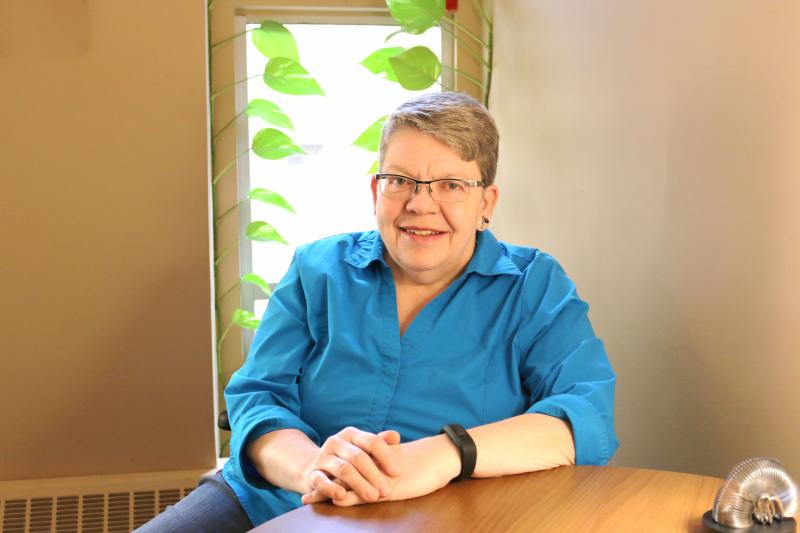April 6, 2017 | Volunteer & Awards
In a crisis, she’s there for students
Helen Slade wins the 2017 Joan E. Foley Quality of Student Experience Award

For an educational institution to be successful, every student must be given every possible opportunity to succeed. Helen Slade’s impact is felt by the University’s most vulnerable students – those who are struggling or experiencing crisis.
For her initiatives in creating Student Crisis Response programs at the University of Toronto, and for her guidance and support of faculty and staff working with students facing challenges in their lives, Slade, Co-ordinator of Student Progress and Support, has been honoured with the 2017 Joan E. Foley Quality of Student Experience Award.
“This university has the most marvellous array of students who are brilliant and independent and they go floatingly along,” says Slade (BN 1974, BEd 1975, MEd 1981, EdD 1995). “But I see the students when something has gone wrong: things aren’t always that easy and life is complicated.” Some of the students Slade deals with have suffered trauma, some have mental health illnesses, disabilities, legal issues or complex personal problems.
In 2004, Slade was one of the originators of the Student Crisis Response program at the University, an initiative aimed at improving access to resources for students in difficulty or crisis. The program became a leading model of outreach and support for students, and it has since been used at post-secondary institutions throughout North America.
In one instance, Slade worked with a student for seven years. The student was under pressure from her family to complete her degree so that the family could then return to their country of birth; however, the student was struggling with some senior courses. Slade researched University policies, found support from a registrar and advocated all the way to the President’s office to allow the student to graduate.
Most cases come to Slade’s attention from faculty and staff, who are finding student behaviour disruptive. She is there to assess the situation, help find solutions and support the faculty or staff members in managing the situation themselves. Often, however, she ends up working directly with the student.
In another instance, Slade was able to help a student who was struggling academically because she was working too many hours and trying to manage an undiagnosed disability. The student was failing, isolated and unhappy. Slade connected her with Accessibility Services, helped her access financial resources so she could reduce her working hours and helped her become part of a community on campus by joining a student group.
“The students who come to our attention are all considered because of their circumstances, and I approach each one by focusing on the positive things we can do while still maintaining academic integrity,” Slade says. “There may be things that have not been considered, possibilities that take a network of people working together to make things happen.”
The thing is, there aren’t any magic one-solution-fits-all situations – there’s no simple checklist or Easy button to push. “This is about looking at each student individually, looking at patterns, structures and solutions in a multi-dimensional way when these students are in complex situations,” says Slade. “It’s about discovering what would benefit the student the most at this time.” Students may not always agree with the decisions, but whatever the outcome, they receive the support they need, they are able to participate fully in the process and they know that the process is fair.
“The mission statement of the University is to help people be full citizens,” says Slade. To that end, she has designed and presented seminars, and offered countless numbers of workshops to faculty and staff. Her work has taught her colleagues that patience is paramount, and every student deserves to be respected and treated with compassion. She focuses on recognizing the inherent value of every student and the profound benefits of overcoming obstacles.
“I am who I am, I do what I do,” she says. “This is about helping students to move forward in their lives.”
The Joan E. Foley Quality of Student Experience Award is named in honour of Professor Joan Foley who was the first female Principal at UTSC and the first female Provost at U of T; her remarkable career at the university spanned more than 50 years. This award is presented each year under the banner of the Awards of Excellence, a program recognizing the outstanding members of the University of Toronto community who have made rich and meaningful contributions to the University, their communities and to the world.
Alumni Relations within the Division of University Advancement is the steward of the Awards of Excellence program on behalf of the University of Toronto Alumni Association, and co-ordinates the vital contributions of other University stakeholder groups toward this prestigious award program.
Helen Slade and the other 2017 Awards of Excellence recipients will be honoured at a recognition event on April 27.

